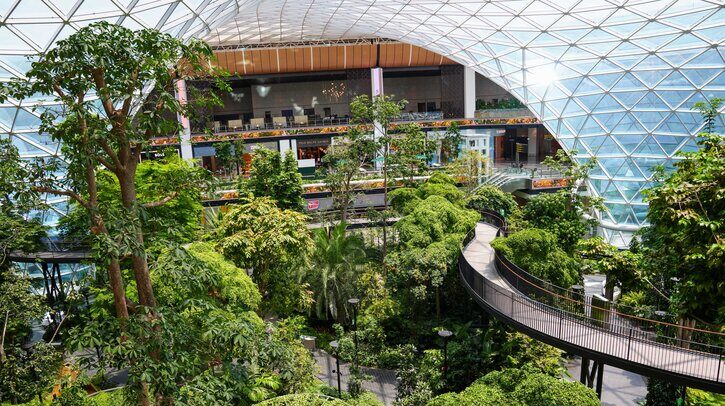
The LEED certification is recognized globally as a prestigious benchmark in green building practices. Hamad International Airport’s Central Concourse received the certification after fulfilling a stringent set of criteria laid down by the U.S. Green Building Council (USGBC). The certification process involved a thorough assessment of the concourse's energy usage, water efficiency, indoor air quality, and overall environmental impact. As a result, the airport joins a select group of facilities worldwide that have achieved this level of recognition, placing Qatar at the forefront of sustainable airport design.
MATAR, responsible for the operation and management of Hamad International Airport, has been progressively focusing on eco-friendly initiatives. The incorporation of the ORCHARD garden within the Central Concourse exemplifies their approach to blending modern architectural design with nature. Spanning 10,000 square meters, the ORCHARD is home to a diverse range of tropical plants, creating an indoor green space that enhances the passenger experience while contributing to the concourse's overall environmental goals. The tropical garden, designed to be energy-efficient, requires minimal water usage and is maintained through innovative irrigation systems, contributing to the overall sustainability objectives of the airport.
LEED certification is awarded based on a point system, with buildings evaluated on several sustainability measures. Points are given for initiatives like energy conservation, reduced greenhouse gas emissions, and sustainable water use. The Central Concourse at Hamad International Airport scored high in categories related to energy efficiency and indoor environmental quality. By achieving Gold status, the airport demonstrates its leadership in sustainable construction, particularly in a sector where energy consumption and carbon emissions are typically high.
The certification of Hamad International Airport’s concourse is part of Qatar's broader vision of sustainable development. This aligns with the country’s National Vision 2030, which prioritizes environmental sustainability as one of its key pillars. The airport’s focus on reducing its carbon footprint and implementing green building principles is expected to set a precedent for other airports in the region, many of which are also striving to enhance their sustainability credentials.
Passenger experience has also been a major factor in the success of the Central Concourse. The ORCHARD’s carefully controlled climate and natural design not only offer travelers a relaxing environment but also reflect the airport's broader goal of creating spaces that are both functional and environmentally friendly. The use of natural light, coupled with energy-efficient lighting systems, reduces the concourse's energy consumption, contributing to the high marks the building received for its LEED certification. Moreover, advanced air filtration systems ensure that the indoor air quality remains high, which is particularly important in a tropical garden setting where maintaining a healthy, balanced climate can be a challenge.
While many airports around the world have adopted eco-friendly measures, Hamad International Airport’s Central Concourse stands out due to its integration of technology and nature in a way that enhances both sustainability and the passenger experience. This model is becoming increasingly popular as airports face mounting pressure to address their environmental impact. With global aviation contributing significantly to greenhouse gas emissions, there has been a growing push for airports to adopt greener practices, and Qatar’s flagship airport is positioning itself as a leader in this regard.
The airport’s efforts to promote sustainability extend beyond the Central Concourse. MATAR has implemented a range of initiatives aimed at reducing the airport's overall environmental impact, including waste management programs, energy conservation measures, and initiatives to reduce single-use plastics. The introduction of electric vehicles for ground operations and the installation of solar panels on airport buildings are part of these wider efforts. These projects reflect MATAR’s ongoing commitment to ensuring that Hamad International Airport remains at the forefront of environmental sustainability in the aviation industry.
Qatar’s focus on sustainability is evident not just in its airport infrastructure but also in other key sectors such as energy and urban planning. The country has made significant investments in renewable energy projects, and the development of sustainable urban spaces has been a priority. The LEED Gold Certification for Hamad International Airport is, therefore, part of a broader narrative of Qatar’s ambition to be a global leader in sustainable development, particularly in preparation for the World Cup and beyond.
Topics
Qatar
